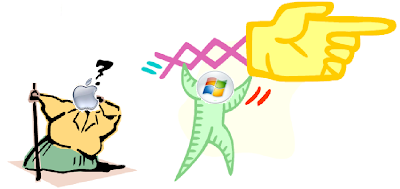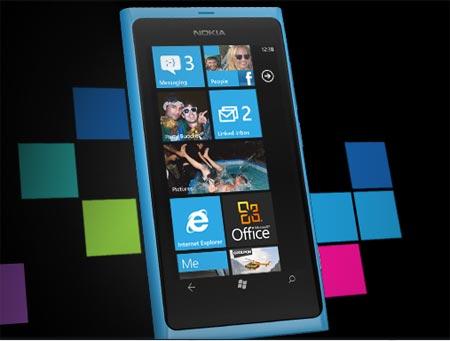Yes, I am asking this question because I really doubt it. At least in India. On one hand, there are reports of people none other than Steve Wozniak (Apple co-founder) praising Windows Phone's features but on the other hand, I still don't see enough Windows Phones on the market or in the hands of my friends. I had to buy one for my wife last month and I got another Samsung Android (in the 15K range) even though a good part of me wanted to go for a Windows Phone. But the lack of applications (along with the lack of the phone itself in one of the leading chains) kept me out of it. I may not even use a lot of the apps but there are a number of apps that I use and if Windows Market Place cannot provide abundant apps, I won't fork out my 15K plus money just like that - right? If I were getting it as a free phone with a 2-year connection like they get in the US, I might have thought about it but even then, I may still have rejected it 'cos of the apps.
So, some of the earliest smart phone experts had predicted that it would be an apps game after all in the smart phone arena. And I guess, with that purchase decision going the Android way for me, even I have finally realized that apps will be the deciding factor. So, let us quickly see where our smart phone players stand in terms of apps. iOS, the pioneer of them all, has more than 500,000 apps; Android has quickly ramped up over the last couple of years on the apps game and now stands around 450,000. Windows Phone is about 10% of these at around 70,000 apps as of 13-May-2012. Now, some of the more detail oriented folks may point out issues like removal of apps and quality of apps etc but even after you do the math to take care of those issues, Windows Phone apps are a small fraction of what is available on the Android Market or Apple's App Store. It is more like 5,000 Windows against 300,000 Android apps (high quality apps). Since I am talking about India, I am not talking about the all mighty iPhone as most people may not want to dish out more dough for a 3.5 inch phone than you do for a 40 inch (plasma) TV.
Now, let us say, maybe the numbers don't really matter for the average dude - you know, just like people put across that argument about processors - the average dude does not need the high end super computer processing capability. Fine, but there are some things I know I MUST be able to do with a processor, for instance, multiple browser windows, multiple tasks and videos and of course FB and Twitter etc. So, let me see what I normally do on my Android phone and see if I can do the same on a Windows Phone if I were to buy one today. Here is a list of the apps that I use on Android and whether or not they are available on Windows (in cases where I am more concerned with the functionality rather than brand, I have indicated yes as long as there is another app that meets that functionality).

Ok, so it does seem it has more apps than I was expecting. The red ones are the only ones where I seriously think there is a problem but others are not a problem for me. Even though there are no official apps for LinkedIn and Dropbox, I must say that the focus on apps is not as bad as I thought initially.
Update: LinkedIn has launched an official
WP app and they say in some cases
"Windows Phone app offers even more functionality than its iOS and Android siblings."
So, to be fair, I would say if I had done all this research slightly earlier, I might have gone for WP because it does look like meeting my needs more or less. I am not a fussy guy after all (or so I think!). I am not sure what the other hundred thousand apps are on Android, but I apparently am not using them. So, what I need is pretty much out there in Windows Phone as well. But the big P.O.I .N.T is that no one knows this fact. So, Nokia and Windows should let people know that. Do they expect all their customers to do this research before buying a phone?
So, when I started writing this article (more like a rant), I knew what Nokia and Microsoft have been openly telling me and other consumers and did not know what they have not been telling us. So, I thought Windows Phones are good but I think they lack the apps. If only someone had told me that most of what I use is there in WindowsPhone (courtesy some good application development work driven by someone in one of these companies), I might have been sporting a cool Windows Phone as well!
I mentioned
previously that Nokia seem to be goofing up in India by pushing their overseas ads for Lumia in India as they don't seem to connect. I did see some Indian ads finally for Nokia Lumia - a guy saying something about the usefulness of the Nokia Lumia while babysitting kids. Thanks for the Indian ad Nokia but I am sure the youth of India would like to see themselves in much more exciting situations than babysitting! Samsung had used the setting of impressing a girl with the Samsung phone - so cliched, I know, but at least it works!
I was also happy to see Nokia introducing phones at various price points and probably varied features to give some choice to the consumer. The website mentions 3 now, which is some good news! Nokia Lumia 800, 710 and 610 are mentioned on the Nokia India website but the online shopping websites seem to have only the 800 and 710 at approx 24K and 15K respectively.
I had come up with the title for this article before starting to write it. Hence, before I started it, I thought Windows was goofing up big time on apps also, but it seems they are on the right track there; they are not up there yet, but are on the right track. So, after this realization about apps, should I change the title of this article? I decided against changing it because the average customer on the streets is still not gung-ho about this apparently capable phone. Are they letting a capable phone go down because of poor marketing or is it something else?
OR Am I missing something here? If so, please share your thoughts - I will be happy to learn!





















